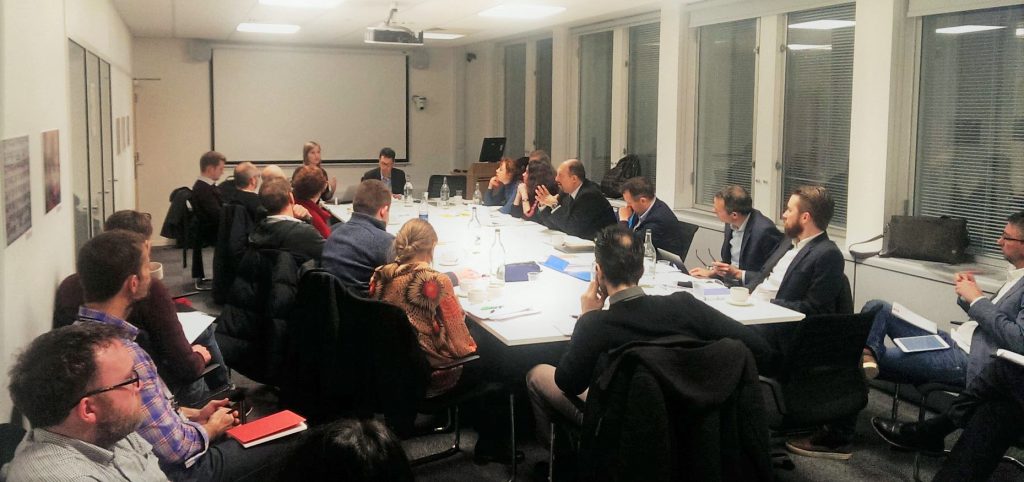On 29 November, thirty scholars met to discuss neoclassical realism in a day-long workshop organised by Gustav Meibauer and funded by the IR Department. The workshop brought together senior and junior researchers as well as doctoral students from the UK and from as far as Russia, Turkey, the United States or China.
Together, firstly, they assessed neoclassical realism’s roots, theoretical scope and domain as well as its core assumptions. Secondly, they investigated neoclassical realism’s potential to bridge paradigmatic divides in the study of foreign policy and international politics, including through the integration of or fruitful juxtaposition with classical realist, liberal, constructivist and critical scholarship. Thirdly, they interrogated a thusly reformulated neoclassical realism’s potential to provide answers to core disciplinary questions in a changing world.
Neoclassical realism is a theoretical framework to analyse the foreign policy behaviour of states and the effects different foreign policies have on international politics writ large. Neoclassical realists agree that what matters most in driving state behaviour (e.g. choosing allies, signing trade agreements, imposing sanctions, declaring war, and so forth) are incentives and constraints provided by the external environment in which states are located. This external environment, however, is complex, and its incentives and constraints rarely (if ever) straightforward. Neoclassical realists argue that the “transmission belt” from the external environment to state behaviour is therefore mediated by variables at the domestic level, such as statespersons’ beliefs, the type of regime (democratic or authoritarian) or the level of effectiveness in the bureaucracy.

Just as within any other theoretical approach to studying complex social phenomena, different neoclassical realists have different approaches to their paradigm’s building blocks. While they agree on the shared intuition described above, they conceptualise the external environment, intervening variables, and the objects of their analysis ever so slightly differently. They study different countries and different time-periods to test their intuitions and further develop the approach.
This breadth has led other scholars to suggest neoclassical realism was eclectic, incoherent and in violation of own paradigmatic assumptions. A recent critic even argued the approach was beyond saving and should be abandoned altogether. These criticisms should be taken seriously in so far as they can prompt neoclassical realists to carefully rethink and re-state their assumptions, scope conditions and objects of study. At the same time, globalisation, digitisation and a changing geostrategic environment, as well as the resurgence of populist movements across the globe pose new empirical challenges for the framework. Ample reason, then, to reappraise neoclassical realism.
In two initial panels, neoclassical realists as well as their classical realist and constructivist critics tackled their tasks with rigor and enthusiasm. A first panel addressed whether neoclassical realism can become more global and more normative while retaining its aspirations for general and simple theoretical explanation. Michiel Foulon and Gustav Meibauer suggested ways in which neoclassical realism’s bridging character and theoretical openness can be harnessed as a theoretical strength (rather than continuously thought of as a weakness). Alexander Reichwein and Benjamin Herborth eloquently discussed the classical realist roots of neoclassical realism in terms of intellectual tradition, core concepts and normative orientation.
Next, Klaus Brummer moderated the discussion on Davide Fiammenghi’s paper on Waltzian methodology, Keith Smith’s careful re-conceptualisation of “security” within neoclassical realism, and Nicholas Kitchen’s ambitious reformulation of neoclassical realism as a theory not only of foreign policy but also of international politics.

After lunch, Balkan Devlen, Elena Pavlova, Elena Kropatcheva and Camilla Sørensen started to put some additional empirical meat on neoclassical realism’s theoretical bones. In doing so, they conceptually developed the role of leaders, of legitimacy and regime security, as well as the particular nature of rising authoritarian states in mediating the geostrategic pressures that states and entities as different as China, Russia or the EU face. Chair James Strong expertly chaired the session.
In the last panel, Linde Desmaele presented a paper (co-authored with Luis Simon) that elegantly re-stated neoclassical realism to analyse US strategic prioritisation between Europe and East Asia. Tudor Onea carefully developed a response to recent critics of neoclassical realism at the same time as he suggested how the theoretical approach could profit from focusing on a state’s grand strategy (rather than more short-term foreign policy). Jørgen Staun outlined the important role of strategic culture in Russian geostrategic positioning in an empirically rich presentation, before Nicholas Ross Smith demonstrated how neoclassical realism can help explain state behaviour beyond modern great powers by focusing on two historical cases of small state hedging.
Two leading voices on neoclassical realism, Steven Lobell and Jennifer Sterling-Folker, then kicked off a final group discussion with some critical reflections on how the approach developed, where it is currently situated in the discipline, and what future innovations it may bring. Neoclassical realism as an approach can only profit from carefully rethinking where it is positioned ontologically, epistemologically and methodologically, and where it can add to conceptions of power, interest, history and context. In so doing, neoclassical realism can confidently (re-)state its own contribution, and in fruitful juxtaposition with other approaches help better understand and explain empirical phenomena such as conflict, security, power, and foreign policy choice.
Report by Dr Gustav Meibauer


